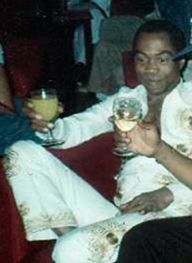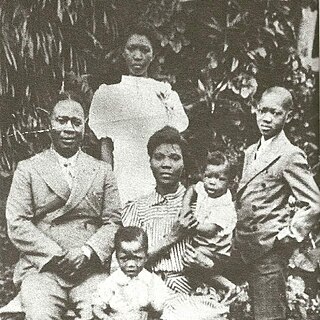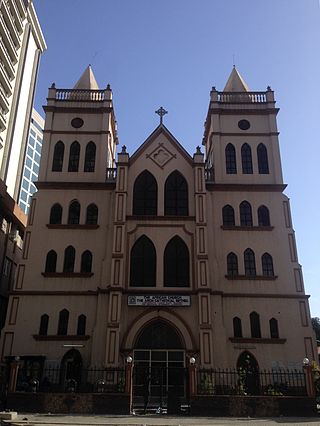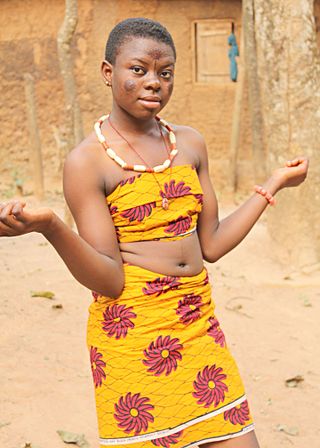
An antiphon is a short chant in Christian ritual, sung as a refrain. The texts of antiphons are usually taken from the Psalms or Scripture, but may also be freely composed. Their form was favored by St Ambrose and they feature prominently in Ambrosian chant, but they are used widely in Gregorian chant as well. They may be used during Mass, for the Introit, the Offertory or the Communion. They may also be used in the Liturgy of the Hours, typically for Lauds or Vespers.

An agape feast or lovefeast is a term used for various communal meals shared among Christians. The name comes from the Greek word ἀγάπη (agape), which implies love in the sense of brotherly or familial affection.

Fela Aníkúlápó Kútì, also famously known as Abàmì Ẹ̀dá, was a Nigerian musician, bandleader, composer, political activist, and Pan-Africanist. He is regarded as the King of Afrobeat, a Nigerian music genre that combines West African music with American funk and jazz. At the height of his popularity, he was referred to as one of Africa's most "challenging and charismatic music performers". AllMusic described him as "a musical and sociopolitical voice" of international significance.

Anglican church music is music that is written for Christian worship in Anglican religious services, forming part of the liturgy. It mostly consists of pieces written to be sung by a church choir, which may sing a cappella or accompanied by an organ.

Church music is Christian music written for performance in church, or any musical setting of ecclesiastical liturgy, or music set to words expressing propositions of a sacred nature, such as a hymn.

Henry Townsend (1815–1886) was an Anglican missionary in Nigeria.
A missionary bishop is one assigned in the Anglican Communion to an area that is not already organized under a bishop of a church. The term was also used in the Methodist churches at one time, but this was discontinued in 1964.
Protestants in Japan constitute a religious minority of about 0.45% of total population or 600,000 people in 2020.

The Ransome-Kuti family is a Nigerian Yoruba political family noted for its simultaneous contributions to art, religion, education and medicine. It belongs to the Nigerian bourgeoisie, and also has historic links to the Nigerian chieftaincy system.

The Church of Ceylon is the Anglican Church in Sri Lanka. It is an extraprovincial jurisdiction of the Archbishop of Canterbury, who serves as its Metropolitan. It was established in 1845 with the appointment of the first Anglican Bishop of Colombo, James Chapman and until 1950 it consisted of a single diocese; in that year a second diocese was established at Kurunegala.

The African Church is a Christian denomination that was established in the British colonial areas that later became Nigeria in 1901. It was established after strong disagreements arose between the European leadership of the Anglican Church and the native African leadership. Following the installation of Bishop Samuel Ajayi Crowther, a black African leader of the Anglican Church and translator of the Bible into the Yoruba language, as the head of Church of Nigeria, a number of African clerics obtained progressive education but did not advance in the leadership of the Church. This led to schisms that finally led to the formation of the indigenous African Church.
The Anglican Diocese on the Niger is the mother diocese of the Church of Nigeria. It is one of 10 Anglican dioceses in the Anglican Province of the Niger within the Church of Nigeria. The diocese was created in 1864 as the 'Diocese of West African Territories Beyond the British Dominions' or 'Diocese of the Niger' with Bishop Samuel Ajayi Crowther as the bishop. At Crowther's death in 1891, the diocese was merged with the Lagos and Yoruba sections of the Nigerian mission which had been under the Diocese of Sierra Leone and renamed 'the Diocese of Western Equatorial Africa' with Bishop John Sidney Hill as bishop. He was succeeded by Bishop Herbert Tugwell. In 1920 the Diocese of Equatorial West Africa was divided into two: an eastern part and a western part. A part of the Diocese on the Niger was subsequently carved out in 1946 to create the Niger Delta Diocese.

Oji River is a Local Government Area of Enugu State, Nigeria. It borders Anambra State and Abia State. Its headquarters are in the town of Oji River. The towns within Oji River L G A are:- Inyi, Achi Agụ, Achị Ụlọ, Awlaw, Akpugoeze, Oji-River Urban and Ugwuoba.
The Methodist College of Uzuakoli is a college in Abia, Nigeria.

The Badagry in Bariga, a suburb of Lagos in Lagos State, is the oldest secondary school in Nigeria, founded on 6 June 1859 by the Church Missionary Society. For decades it was the main source of African clergymen and administrators in the Lagos Colony.
The Ecclesiastical Province of Lagos is one of the 14 ecclesiastical provinces of the Church of Nigeria. It comprises 13 dioceses:
Josiah Jesse "J.J." Ransome-Kuti was a Nigerian clergyman and music composer. He was known for setting Christian hymns to indigenous music, and for writing Christian hymns in Yoruba.

Ikoli Harcourt-Whyte (1905–1977) popularly known as Harcourt Whyte, was a Nigerian composer best remembered for his classic hymn "Atula Egwu".
The Daily Office is a term used primarily by members of the Episcopal Church. In Anglican churches, the traditional canonical hours of daily services include Morning Prayer and Evening Prayer, usually following the Book of Common Prayer. As in other Christian traditions, either clergy or laity can lead the daily office. Most Anglican clergy are required to pray Morning and Evening Prayer daily.












